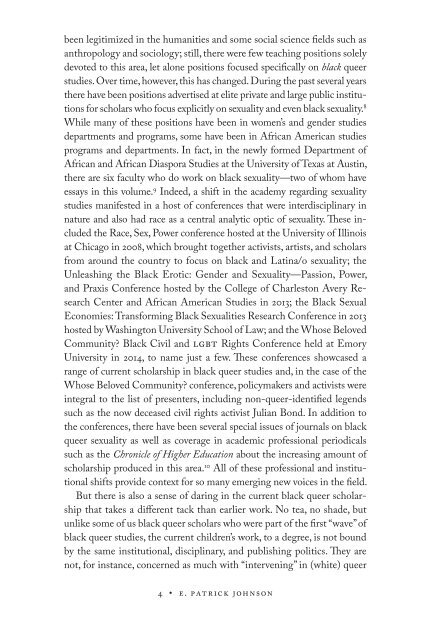No Tea
89AS6wvrf
89AS6wvrf
You also want an ePaper? Increase the reach of your titles
YUMPU automatically turns print PDFs into web optimized ePapers that Google loves.
een legitimized in the humanities and some social science fields such as<br />
anthropology and sociology; still, there were few teaching positions solely<br />
devoted to this area, let alone positions focused specifically on black queer<br />
studies. Over time, however, this has changed. During the past several years<br />
there have been positions advertised at elite private and large public institutions<br />
for scholars who focus explic itly on sexuality and even black sexuality. 8<br />
While many of these positions have been in women’s and gender studies<br />
departments and programs, some have been in African American studies<br />
programs and departments. In fact, in the newly formed Department of<br />
African and African Diaspora Studies at the University of Texas at Austin,<br />
there are six faculty who do work on black sexuality— two of whom have<br />
essays in this volume. 9 Indeed, a shift in the acad emy regarding sexuality<br />
studies manifested in a host of conferences that were interdisciplinary in<br />
nature and also had race as a central analytic optic of sexuality. These included<br />
the Race, Sex, Power conference hosted at the University of Illinois<br />
at Chicago in 2008, which brought together activists, artists, and scholars<br />
from around the country to focus on black and Latina/o sexuality; the<br />
Unleashing the Black Erotic: Gender and Sexuality— Passion, Power,<br />
and Praxis Conference hosted by the College of Charleston Avery Research<br />
Center and African American Studies in 2013; the Black Sexual<br />
Economies: Transforming Black Sexualities Research Conference in 2013<br />
hosted by Washington University School of Law; and the Whose Beloved<br />
Community? Black Civil and lgbt Rights Conference held at Emory<br />
University in 2014, to name just a few. These conferences showcased a<br />
range of current scholarship in black queer studies and, in the case of the<br />
Whose Beloved Community? conference, policymakers and activists were<br />
integral to the list of presenters, including non- queer- identified legends<br />
such as the now deceased civil rights activist Julian Bond. In addition to<br />
the conferences, there have been several special issues of journals on black<br />
queer sexuality as well as coverage in academic professional periodicals<br />
such as the Chronicle of Higher Education about the increasing amount of<br />
scholarship produced in this area. 10 All of these professional and institutional<br />
shifts provide context for so many emerging new voices in the field.<br />
But there is also a sense of daring in the current black queer scholarship<br />
that takes a differ ent tack than earlier work. <strong>No</strong> tea, no shade, but<br />
unlike some of us black queer scholars who were part of the first “wave” of<br />
black queer studies, the current children’s work, to a degree, is not bound<br />
by the same institutional, disciplinary, and publishing politics. They are<br />
not, for instance, concerned as much with “intervening” in (white) queer<br />
4 • E. Patrick Johnson


